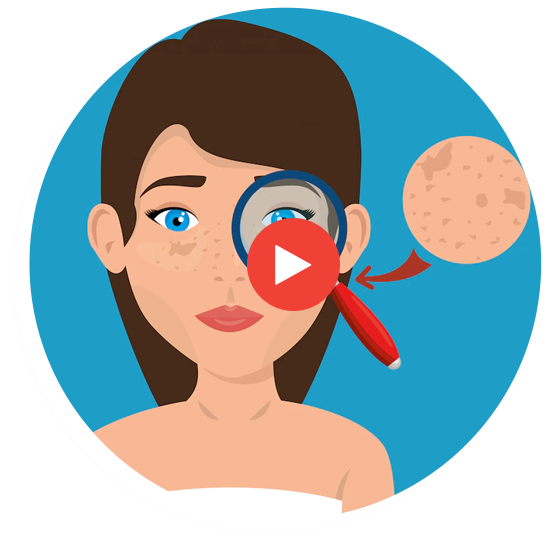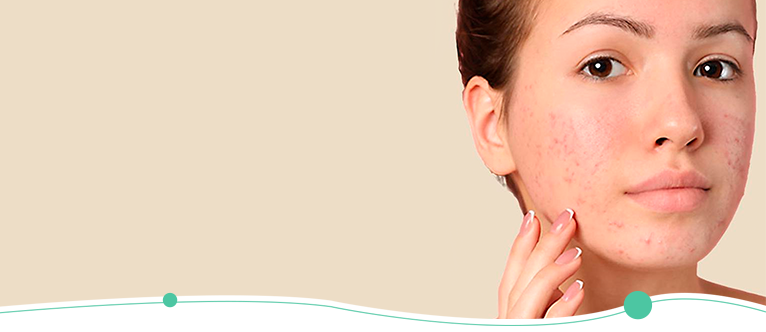
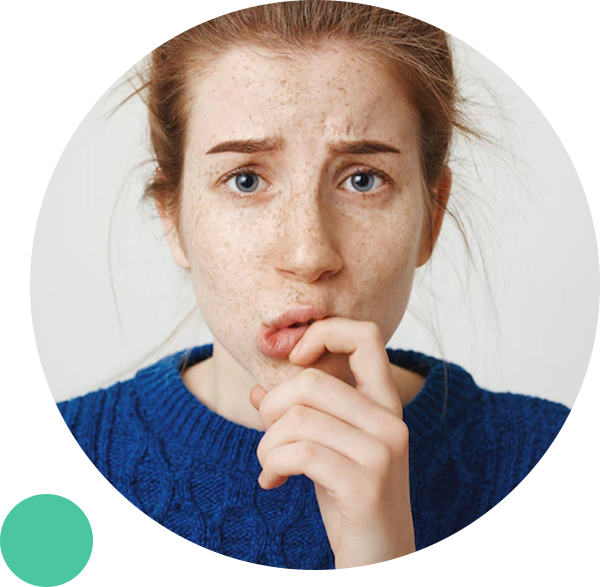
TELMDCARE
What is Acne?
Acne is an inflammatory skin disorder resulting from clogged hair follicles. Each hair follicle contains fine hair. The human body’s sebaceous glands produce sebum, wax, or oil-like substance that keeps the skin from drying out. In healthy skin, the sebum produced by the glands empties onto the skin’s surface through the opening of the follicle, called the pore. The lining of the follicle is a type of skin cell called keratinocytes. Like most skin cells in the body, this cell is subject to shedding, after which it rises to the skin surface.
The sebum from the hair follicle pairs with dead skin cells to plug these pores, which result in the outbreak of lesions (also called zits or pimples). This mixture also allows bacteria to enter the follicles to cause inflammation that’s witnessed in the form of redness, swelling, pain, and heat. When the walls of these plugged follicles break, it spills sebum, skin cells, and bacteria onto the nearby skin to cause additional lesions.
Book an Appointment for Only
TELMDCARE
Is covered by many popular
insurance plans

CAUSES OF
Acne
Acne is largely known to be caused due to excessive production of sebum within the pores, buildup of dead skin cells in the pores, or the growth of bacteria in the region. However, other factors may significantly increase the chances of you developing acne:
Contrary to popular belief, diet may not actively contribute to causing acne but may worsen the existing situation. Likewise, environmental irritants (such as high humidity and pollution), pressure on the skin from objects (like backpacks, tight fabric, and sports helmets), stress, scrubbing, squeezing, or picking on acne might make it worse.
Where Does Acne Appear?
Acne typically appears on the forehead, face, shoulders, chest, and upper back since these are the region’s most densely populated with sebaceous glands.
Who Can Get Acne?
All ages and races are subject to getting acne, especially teenagers and young adults. During their teen, more men are subject to acne than women.
Classification of Acne
The plugged or enlarged hair follicle is known as a comedonal acnethat may cause different types of lesions on the skin, such as:
- Whiteheads: These are closed plugged hair follicles that stay underneath the skin to produce white bumps on the surface.
- Blackheads: These plugged hair follicles make it to the skin’s surface and expose themselves. Blackheads largely appear as black dots due to discoloration of the sebum caused by exposure to air.
- Papules: These are inflamed lesions that appear on the skin’s surface as tender yet tiny,pink, or red bumps.
- Pimples or Pustules: These may be red at the base but are almost always topped with a yellow or white pus filling. They can cause scarring when picked or scratched.
- Nodules: These are some of the most painful solid lesions. Not only are they large, but also buried deep underneath the skin.
- Severe Nodular Acneaka cystic acne: These appear as pus-filled, painful lesions that often leave scars behind as they’re lodged deep within the layers of the skin.
- Fungal Acne: Scientifically known as pityrosporum folliculitis, this type of acne is caused due to excessive yeast development in the hair follicles. They can easily get inflamed or itchy.
TELMDCARE
As Seen On


TELMDCARE
WHAT WE TREAT?
We treat a variety of acute and chronic conditions and provide expert medical advice and guidance for our patients.
Read More
TELMDCARE
How Bad Can Acne Get?
Acne is largely ranked in terms of its severity as grades 1, 2, 3, and 4:
If you’re experiencing the above-mentioned grades of acne, feel free to reach out to our telemedicine doctor for acne today!
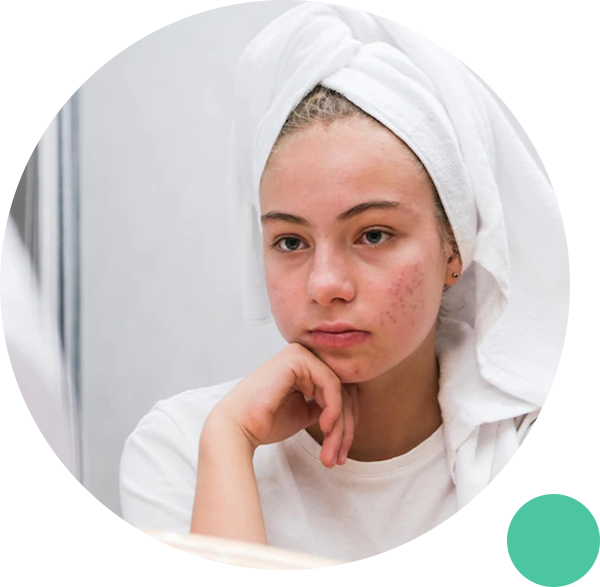
The Complications Caused Due to Acne
People dread acne largely because of its after-effects. Firstly, it can result in scarring that remains on the skin long-term even after the acne has healed completely. This appears as pitted skin or thick scars, commonly known as acne scars and keloids.
Secondly, acne can account for permanent skin changes. The affected region may appear lighter (i.e., hypopigmented) or darker (i.e., hyperpigmented) even after the acne has completely cleared. Unfortunately, darker skin tones are more likely to experience these complications than lighter skin tones.
Medication services available 24/7 for adults and kids (3+)
Top quality, board-certified doctors
No insurance needed
Same-day prescriptions available*
*Prescriptions provided at doctor’s discretion.
TELMDCARE
Why You Need To Stop Picking on Your Acne
If you haven’t already heard it, picking on your acne makes the situation much worse as it causes the lesion to become inflamed. It may begin to appear bigger, start bleeding, or develop a scab. So, one way or another, the pimple will still be there. Not to forget that picking on acne also increases your risk of scarring as your body fails to produce enough collagen to create normal, healthy skin. The inflammation may cause hyperpigmentation on the skin that appears as dark spots even when the acne has cleared up.
The contents of a pimple seem to be pushed outwards when popping a pimple, but some of the content is also pushed inwards towards the layers of the skin. If bacteria had infected the lesion, chances are that you just infected the whole region surrounding the pimple. This may result in permanent skin damage because scarring and hyper-pigmented skin doesn’t really go away on their own.
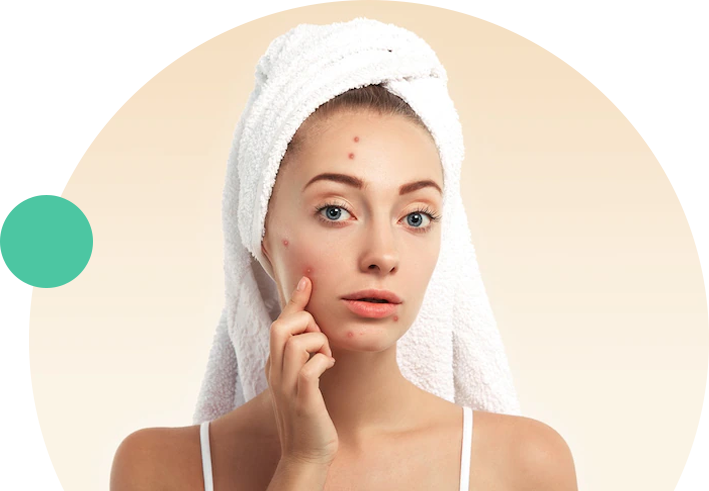
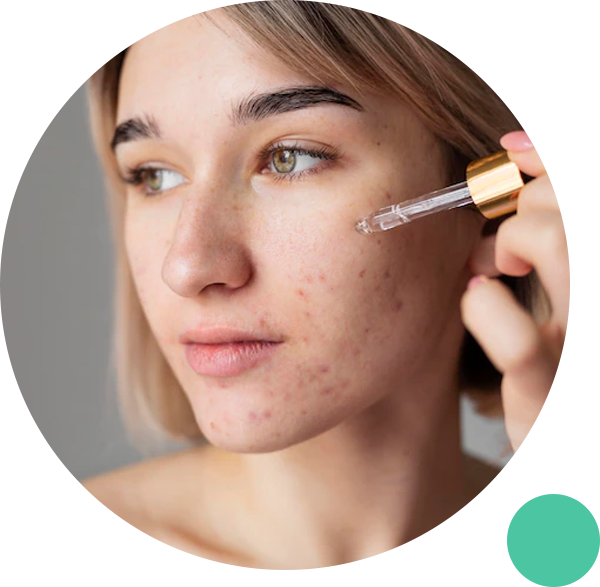
What Treatment Should You Seek for Acne
No, the secret to healthy and clearer skin doesn’t hide in the kitchen either. Using the so-called natural or home remedies might increase acne flare-ups, making the situation much worse than it was initially.
If you are troubled by acne, the best choice is to see a dermatologist who specializes in the treatment of acne. Depending on the type of acne you’re infected by the online doctor for acne may prescribe medicine or prescribe ways to manage it better.
Why Treat Acne Online?
Service charges for TelMDCare are capped at a flat fee of $35. The waiting time for seeing a dermatologist is no more than five to seven minutes. But most importantly, our patient satisfaction rate is a solid 98 percent. Consult a doctor for acne today.

Consult a Virtual Doctor for
Acne Treatment
Sign up for services from TelMDCare; this is an online healthcare facility that uses technology to treat acute, non-emergency health ailments. Services are provided using a video conference, or over a phone call across the United States of America, so you never have to leave the comfort of your home to get acne treatment online.
Our dermatologists have years’ worth of experience stuffed under their belts for treating conditions like acne, skin infection, excessive sweating, eczema, psoriasis, and scabies.
TELMDCARE
Sign Up
Sign up and book an appointment with our specialists to get Acne treatment online today!
$43 SIGN UP
TELMDCARE
FAQs For Acne
The best way to tell if you have a worsening case of acne is to examine your skin. Look for redness or swelling around your acne, as well as pustules or whiteheads. If you see these symptoms, it's time to visit a dermatologist for help.
Topical treatments such as benzoyl peroxide and azelaic acid help reduce oil production and speed healing. Oral antibiotics can be prescribed by your online doctor for acne to kill the bacteria responsible for causing inflammation. In severe cases, surgery may be necessary to remove dead skin cells or other lesions.
There are many factors that can cause acne, including genetics and hormones in the body. Some people inherit a tendency toward having oily skin or breakouts—this isn't something you can control! You may also be more likely to develop acne if you're overworked or stressed out. Irritation from detergents or contact lenses can also contribute to breakouts by causing inflammation in the skin around pores (which increases oil production).



